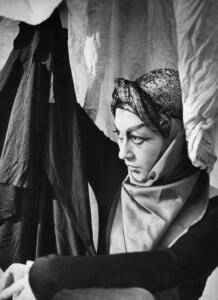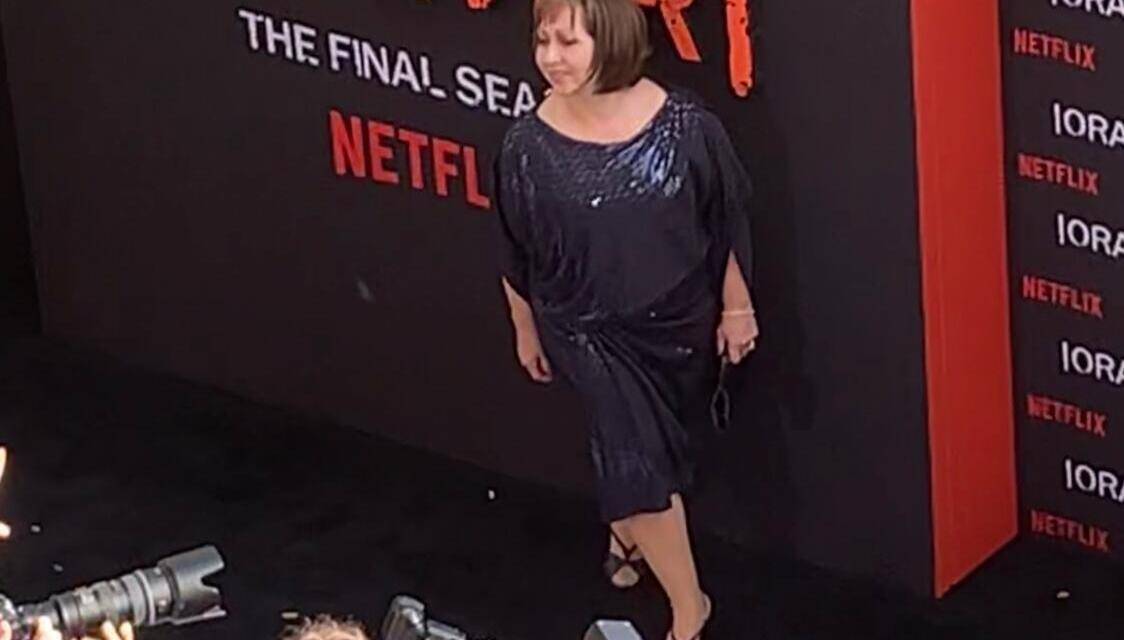American actress of beauty and talent, Támara Torres is a legend of Orange is the New Black, the Netflix comedy-drama television series created by Jenji Kohan. Her portrayal of Emily “Weeping Woman” Germann, propelled her far on the road to stellar fame.
In the 2024 Amazon MGM Studios production Mr. and Mrs. Smith, Ms. Torres delivers a captivating performance as a spy. Eschewing grand gestures, she infuses her characters with an air of intrigue.
Her artistic expression reflects a deep connection to music, with her subtlety carrying an impactful punch, akin to a perfectly timed comedic beat. She once graced the Off-Broadway stage—a stepping stone that led her to the world of motion pictures.
Netflix, a pioneer of the streaming revolution, transformed how we consume media, bringing about the binge-watch phenomenon. Shows like Orange Is the New Black (2013-2019) exemplify this impact, ushering in a new era of television. Torres’ perspective paints a vivid picture of an artist exploring new avenues for creative expression.
“Yes, Netflix was one of the first major streaming platform streaming services. It absolutely has forever changed the way we watch TV. If I’m not mistaken the term New Media was coined in the 1980s. To answer your question I had No idea that Orange would be one of the pioneer shows paving a new era in television. What was most exciting about ‘Orange is the New Black’ is the diversity. The show was mostly represented by female actresses. Starting with the book written by a woman—Piper Kerman and adapted for the screen by creator, writer, and showrunner, a woman—Jenji Kohan. A mostly female cast. Down the line female producers. Camerawomen, directors, and all the females behind the camera. Just amazing. Orange was the first to change the landscape of inclusivity. [The show] giving so many opportunities for all races, colors, sexual orientations and LGBTQ [including] a lovely trans actress as a show regular. The writing allowed for full representation of our jail system. Inclusivity allows the marginalized representation to the fullest without sugarcoating. This is to me one of the most exciting parts of ‘Orange is the New Black’,” says Torres, whose identity includes Puerto Rican, Cuban, and French heritage.
She continued, adding,
“Yes, I did recognize the cultural shift it would create. But I wasn’t sure how it would be accepted by the audience, society, and the world. Wow! When the show was released I was blown away by the sheer positive reaction [of] the fans worldwide. The fans were deeply affected and moved by the show. To this day, years after the show was canceled fans have been requesting a reboot, The mostly female audience has said that OITNB changed their lives.”
While not a central character, Weeping Woman captivated audiences, achieving recognition within the show’s universe. Though frequently seen in tears, a certain air of mystery surrounds her quiet demeanor.
“Weeping Woman! Oh my what a character. She is the suffering of all women behind bars. All sad weeping women at a phone booth. She never got a back story. [I] don’t know why or how or what circumstances lead her to prison. I had to give her an authentic voice. Tears and sadness were written. I chose to cry tears of joy rather than tears of sadness. Using joy was my way of keeping myself from being affected by the pain. I would see people laugh when they saw Weeping Woman on the phone. They may have picked up on my joy and the irony. Bringing Weeping Woman to light with authenticity, compassion, and kindness was important,” said Torres.
Produced by Tilted Productions in association with Lionsgate Television, OITNB entertained audiences and sparked important cultural conversations. The groundbreaking series received six Golden Globe Award nominations, and a Peabody Award, and her character, Weeping Woman has inspired several works of art.

Támara Torres as Emily “Weeping Woman” Germann in Orange Is The New Black (2013-2019). The original series earned 12 Emmy Award nominations for its first season, winning three. Photo courtesy: Netflix.
She continued, adding, “Piper Kerman has supported the Woman’s Prison Association (WPA) an organization that advocates for woman with criminal histories. WPA helps with family issues, housing, health, employment, and family service helping them start over. When I met some of the ex-prisoners they would thank me for representing them as it was for them behind bars. Weeping Woman represents the pain and suffering a woman, mother, or sister, feels when she’s ripped from her beloved children, families, or unforeseen life choices.”
Widely acclaimed throughout its run, Orange Is the New Black was Netflix’s most-watched and longest-running original series. The show earned 12 Emmy Award nominations for its first season, winning three. Torres’ portrayal undoubtedly contributed to the show’s success.
“I have to mention Weeping Woman wore a blue denim MuMu in most of the episodes with the exception of one episode. I always wondered why. In my research, I found out MuMu uniforms were given to prisoners who were suicidal, You can’t do anything without long shelves or pants to possibly use as a weapon to self-injure. You know like hanging. Keeping that in mind, maybe Weeping Woman had been suicidal. It was an honor to give Weeping Woman a voice representing all traumatized, suffering women behind bars.”
She has magnetism. Ms. Torrres elevates seemingly smaller roles, transforming them into the cornerstone of a masterpiece. Her theatre background prepared her well for the demands of film and television acting.
“My transition to film and TV impressive? Wow! Thank you so much. I’ve never thought of it that way. Thanks again. How had my theater background prepared me for TV and film acting? It was a long winding road that I was ready to take a detour on several times. I felt that training definitely was an important part. My training and theatre background made a big difference. I learned so many invaluable things in theater: teamwork for ensemble work; listening and memorization skills; diction; self-confidence; empathy; creative skills; communication; taking chances; and how to work under pressure and independently if needed. Most importantly, how to take directions. I’m sure I’m forgetting others. The coaching and practice taught me so much. A main difference is theatrical acting is grand in larger audiences. TV and film are smaller and more intimate—it’s acting to cameras.”
She continued, adding, “The environment you’re performing in can be with a circle of cameras and tech people or much larger depending on the project. That was something I had to learn fast. Nobody taught me that. [I] had to learn that on the job. Where are the cameras placed? Who are you talking to? Which direction are you moving in? What camera do you sync with? I find that a fascinating part of working in TV and film.”

Támara Torres as Lupita in the comedy film Nick & Nicky (2022). Photo courtesy: Patrick Askin.
This dedication exemplifies the transformative power seemingly smaller parts can hold.
“You might not have much dialogue but you have to get a point across without overdoing it. The scene is not about you in those scenes. It is about what’s happening with the main characters. You have to keep that understanding especially if you were playing the lead role in theater and now in a TV show you’re a day player with only one word or few lines. My first TV job was ‘Law & Order.’ I was so excited to book it. [I] only had two words: Yes and Yes. LOL. I didn’t care. I was thrilled to finally start working on a TV show. It was a dream to me—a job where I got paid, had fun [and] then got residuals hallelujah! That show opened the door to other work opportunities. So grateful,” said Torres.
Ms. Torres has been associated with the motion picture industry in various capacities for several years. Collaborating with renowned directors and actors has undoubtedly enriched her process.
“Collaborating with wonderful directors and actors has been a unique and diverse learning experience. You see their process, their ease, and their creative flow. One specific instance where a director impacted me was on my first day of work on Orange is the New Black. On set, I was prepared with my lines and scene. The one thing that I wasn’t aware of was who was directing until I saw the sides in my dressing room. Usually, an actor knows beforehand but sometimes it is not revealed. When I saw her name on the sides sheet I got nervous for a moment. It was an actress I admired and she was directing me. Jody Foster showed up and I was like OMG! We did a rehearsal of the scene to pace the scene and adjust mics and cameras. When we were ready to roll cameras she let me run my lines and do my thing which was lots of crying. When we stopped for a camera adjustment she came over and said something unusual but moved me. She said something to the effect: ‘I’ve never seen your work before. Where have you been? what’s your background?’ I said: ‘theater—I come from a theatrical background.’ She said, ‘Theater? Hmm that’s great.’ At that point, she gave me a small directorial adjustment. We shot the scene again a few more times then that was it. I thanked Jody. We gave each other a brief hug thanked everyone else on set and left. [I] was done for the day. I was only a day player so I wouldn’t be returning. As I walked out of Astoria Studios I thought wow! That was [an] exciting thrilling moment in my life. When can I do it again? But that wasn’t the end of the story. The next day, my agent at the time called me up. She had good news. I was invited to be a recurring actor on Orange. I thought I would be invited to be recurring for that one episode. [In] the first season I recurred in five episodes. When the show was released, I do admit [that] I was disappointed that all my dialogue was cut. All you saw was Weeping Woman crying on the phone in those five episodes. Thinking maybe I messed up somehow, I thought that was it. I was done with the show. But Weeping Woman wasn’t done. That one-day player job turned into a seven-year recurring role. So thank you Ms. Jody Foster for the honor of choosing me to play Weeping Woman in your first directing role on OITNB. So grateful!” said Torres.

Támara Torres in an Off-Broadway production of Euripides’ Medea in the 1980s.
She elaborates further, stating:
“Interesting Question. How my musical background influences my acting process and finding inspiration from music or techniques that carry over into my craft? Your question made me realize that subconsciously I do use music as a tool for inspiration. Music is a huge part of my life. I’m a classically trained singer. Switching to Jazz along the way, [I] toured abroad [and] then switched to musical theater. I produced my first CD ‘Tu Esencia.’ It’s Latin Jazz. The music was written by Maestro Lou Perez whose song ‘De Todo Un Poco’ was featured in the film Dirty Dancing. Upon my return to the US, I told Lou I wanted to record in Spanish. He said: ‘Do it! I can help you with that.’ Lou was a composer, lyricist, flutist, pianist, bandleader, and arranger who popularized Latin Charanga music during the 1960s and 1970s. When I first heard the song ‘Nuestra Herencia’ I was blown away. It was a song that described Afro-Cuban music from its start in Africa. I don’t think he got the recognition he so deserved,” said Torres.
“My desire to sing in Spanish inspired Lou to write me…let’s say to write himself some lovely ‘Musica Romantica’—romantic music. The wonderful thing about Lou was he included me in his musical process allowing my input, opinions, creativity, and ideas in his musical compositions and lyric writing process. I was surprised when he asked me to translate one of his songs into English because he spoke perfect English and did his own translations. After I released my CD, Lou gave me more tunes he wrote. He said to me: ‘Tamara here hope you will use these songs on your next CD.’ Now go find a sponsor or a way to fund our new music project. Maybe he’ll help from Heaven. It was a true honor and privilege to have shared in this creativity with Maestro Lou Perez.”
“Music is how I start my day. It sets my vibe and brings me joy, tears, happiness, comfort, and strength. There are so many songs that have accompanied me at different points throughout my life’s journey. There have been roles that trigger a song that plays in my head all day. Like a chant, music is the spiritual background of my life. I’m inspired by many different genres: Rock, Pop, R&B, Jazz, World Music, Classical, and more. If I’m working on a project the theme song of the day would depend on the mood of the character that was to be created for the scene that day. Like the song ‘This Girl is on Fire’ brings confidence. I’ve used it to inspire me in a particular situation in a scene that requires confidence. I subconsciously used ‘This Girl is on Fire’ when I played the role of Marla on a show I recently worked on Mr. & Mrs. Smith. For some reason that song kept popping up on my top music playlist so Marla was on fire,” chuckled Torres.
Well-developed portrayals can contribute significantly to the overall narrative, ultimately elevating the viewing experience. Now, Torres’ creative process is not only accepted in Hollywood; it is also being celebrated.

Emily “Weeping Woman” Germann in Orange Is The New Black (2013-2019). Photo courtesy: Netflix
This artist reminds us that the subtlest details can be the secret sauce that elevates an entire experience.
“With Weeping Woman, by the way, I forgot to mention her name: Emily Germann. One of the songs was ‘Brave.’ It was a song that brought me joy so I could cry in the emotional phone scenes. To be brave enough to withstand what Weeping Woman had to endure in prison. There were other theme songs for Weeping Woman: ‘Hold On to Yourself,’ ‘Beautiful,’ ‘When We Believe” and ‘Dream On’ among others. Music brings me into the vibe and rhythm in life and when in a character. Sometimes after a long day on set, I will welcome a good cup of coffee and a good song to accentuate an amazing pick me up,” said Torres.

Director and star of the film American Pastoral Ewen McGregor and Támara Torres.
Always one to push boundaries, Ms. Torres is currently working on exciting new projects that promise to further solidify her position as a leading voice in the industry. While details remain under wraps, her dedication to impactful storytelling ensures these upcoming ventures will be highly anticipated.
“Existing new projects? There’s always something on the burner but sometimes I can’t discuss them. I can talk about ‘Mr. & Mrs. Smith’ on Amazon Prime. It was so exciting to play Marla. I’m a guest star in the first episode of a spy show. My first spy adventure. I’m thrilled! It’s loosely based on the original film Mr. & Mrs. Smith with Angelina Jolie and Brad Pitt. Mr. & Mrs. Smith, the TV show is different though. It blends action comedy and suspense beautifully,” said Torres.
She continued, adding,
“A fresh face to streaming. A thrilling, captivating intelligent action dramady. One of my friends wrote that Marla gave an air of [a] Hitchcockian Femme Fatale! Ha ha! I love that comment. Details on something that might pique your interest? Well! I imagine, write down, and create my own backstory. The reason for this is to give my characters a mission or a purpose. Where does she come from? Who is she? What motivates her? What would I do in her place? What would she do in my place in life? What does she feel? Backstories give life to the character that an actor can live her experience, express, and play with. Not having that info available to me makes my character non or two dimensional. I want that character the be a multiverse. Of course, it’s only in my head; I would never let it interfere with what’s written in the script when I’m acting and she has no backstory. Unless I’m allowed to improvise. With Weeping Woman the backstory in my head. She was the family Matriarch king Pin Boss of a huge Anebolic Steroid Empire. I got the idea as I was reading some dialogue I was to shoot for OITNB. She was on the phone talking to her son and discussing some weaknesses that her son’s wrestling opponent ‘The Scare Crow’ had. She was giving him encouragement on how her son could defeat him. In my head, Weeping Woman was a mentally torn Griselda—the drug lord only dealing in illegal steroids.”
“Marla was another interesting character without a backstory. So my invention, my created story for Marla spanned time. To me, it would have been funny to see Marla multiple times as the chameleon undercover spy who can never finish her assignment due to the interference of Mr. & Mrs. Smith. A late bloomer fumbling femme fatal with boy toys in every port she works in. She’s cunning, smart, sweet, cruel, and colored by spice with an eye for adventure, intrigue, and men. Her strong point is invisibility in plain sight. Blending in is what’s made her a success. Marla’s perseverancia keeps her afloat but barely these days. That’s my mind at work when I have a character that isn’t dressed with a backstory for me. Marla! She’s The Girl on Fire!”

Támara Torres with Maya Erskine on the set of Amazon MGM Studios’ Mr. & Mrs. Smith.
Ms. Torres’s influence extends far beyond captivating performances. Her work actively fosters inclusivity and dismantles outdated narratives, leaving an undeniable mark on the cultural landscape.
“My cultural background? I’m Hispanic. But I’m a product of New York City—I grew up in Hamilton Heights, the East Village, and Washington Heights. My parents were immigrants. Growing up in a Puerto Rican and Cuban cultural environment, I was exposed to a variety of customs, foods, art, and music. My parents thought it was important that I learn their native tongue Spanish. For that, I’m so thankful. I was made aware of my Spanish ancestry at a young age. My mom would tell me stories about our ancestors and what they went through. She would cook dishes from Puerto Rico, Cuba, and Spain,” reflects Torres.
“I have vivid fond memories of my parents having gatherings with friends and family. Mom would be cooking pállela in the kitchen with the ladies helping while musician friends of my dad’s would be playing flamenco guitar or The Quatro guitar, playing Puerto Rican Jibaro music in the living room. To me, those days are treasures. Those were special times. As a kid, I was so fortunate to have been exposed to so much culture. [On] Sundays we had family TV night. That meant shows like The Ed Sullivan Show, The Twilight Zone, Star Trek among others. Mom loved her Telenovela—they were so melodramatic but I’d watch with her. My parents wanted me to have cultural exposure. It was a sacrifice for them but they had me study flamenco dance exploring my roots as well as classical ballet. When my grandmother would come up from PR, she’d stay for months. Her favorite thing was going to see movies specifically movies from Argentina, Spain, and the Golden Age of Mexican cinema. Maybe that and Saturday’s monthly movie matinée was how I got hooked on showbiz.”
“Grandma taught me about herbal remedies and my French Ancestors. She was so kind and glamorous in my eyes. I went to an Arts public elementary school so I was performing in school plays at a young age. The school had outings to Broadway shows and vocal lessons among other creative activities. My big role then was playing Maria in ‘West Side Story’ in sixth grade. My parents were so proud. Always encouraging me to get an education and pursue what I loved. My cultural heritage has colored my life. I’m so grateful and proud to have had wonderful parents who encouraged so much light in my life,” expounded Torres.
The brilliant actress delivered a powerful performance alongside renowned actors Ryan Gosling and Michelle Williams as Maria in the acclaimed film Blue Valentine (2010) and has numerous silver screen successes to her credit: Bolia in Like Sunday, Like Rain (2014), Carmen in Those People (2015), Tula in I Shudder (2016), Lana in The Blacklist (2020), and Lupita in Nick and Nicky (2022).
Ms. Torres’ work as a television and cinema star has been delightful in the past and it promises to be more so in the future.
Story by © 2024 Alexander Fatouros. Editor, The Theatre Times
This post was written by the author in their personal capacity.The opinions expressed in this article are the author’s own and do not reflect the view of The Theatre Times, their staff or collaborators.
This post was written by Alexander Fatouros.
The views expressed here belong to the author and do not necessarily reflect our views and opinions.


















